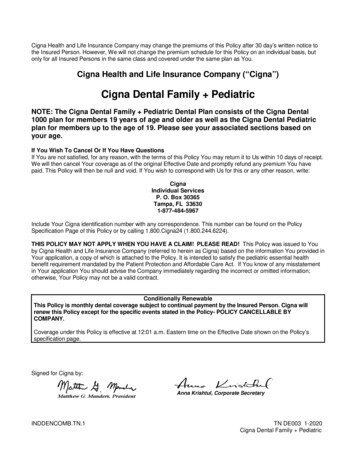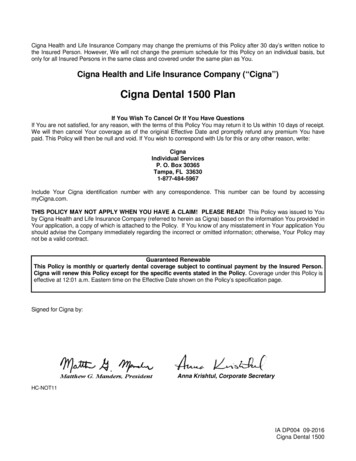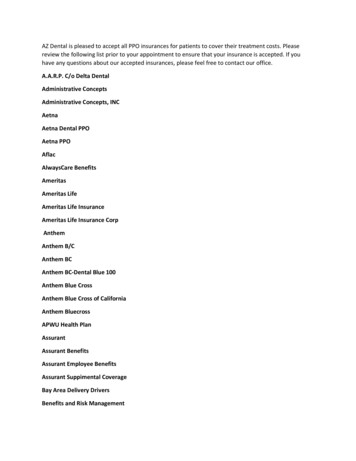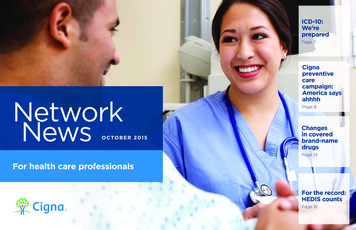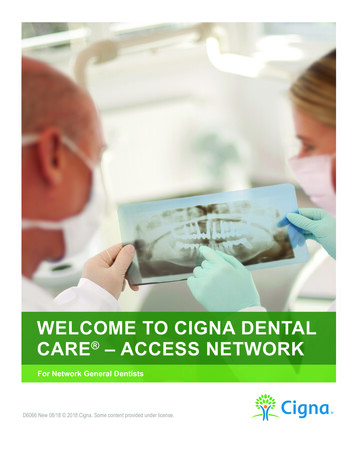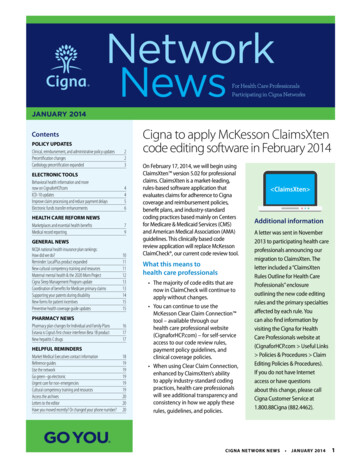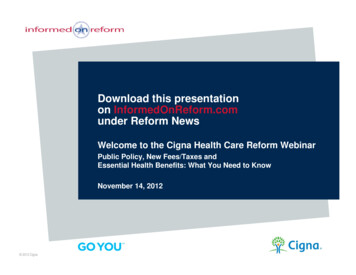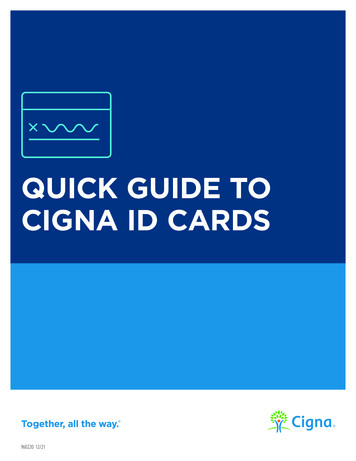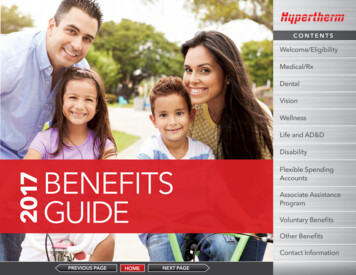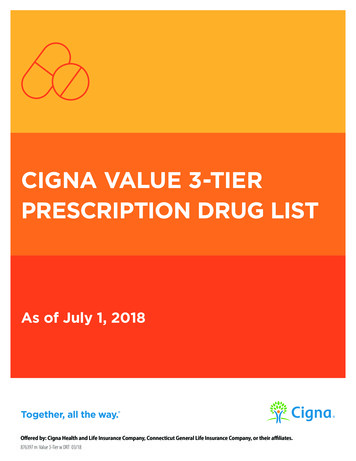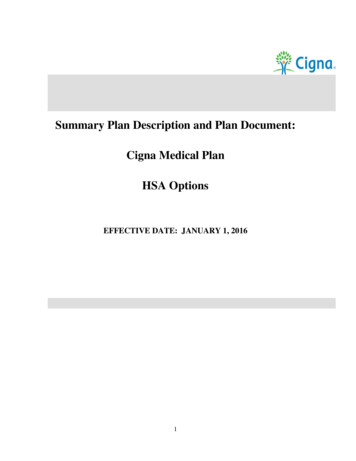
Transcription
GUIDE TOA GOODNIGHT’S SLEEP
Guide to a good night’s sleepEverything you ever wanted to know about sleep butwere too tired to askWhy do we sleep?Non-REM sleepPut simply, we sleep in order to allow forvital brain development. Sleep is essentialfor maintaining normal levels of cognitiveskills such as speech, memory andinnovative and flexible thinking.During non-REM sleep brain activity is quietbut the body may move around. Hormonesare released into the bloodstream and ourbody repairs itself after the wear and tearof the day. Non-REM sleep is split into fourstages:Without sleep our brain’s ability tofunction is seriously impaired. In fact,sleep deprivation affects our ability toconcentrate, respond to rapidly changingsituations and make rational judgements.Lack of sleep also impacts upon ouremotional and physical health.‘Sleep and Health are strongly related: Poorsleep can lead to poor health, and poorhealth can lead to poor sleep’ 5What happens when we sleep?Sleep occurs in a recurring cycle of 90to 110 minutes and is divided into twocategories: non-REM and REM sleep.Stage one: light sleepOur muscle activity slows down and slighttwitching may occur. This is a period of lightsleep, meaning we can be awakened easilyat this stage.Stage two: true sleepThe breathing pattern and heart rate startto slow down.Stages three and four: deep sleepDuring stage three, the brain begins toproduce delta waves, a type of wave thatis large (high amplitude) and slow (lowfrequency). Breathing and heart rate are attheir lowest levels.Stage four is characterised by rhythmicbreathing and limited muscle activity.Quick factWe spend a third of ourlives asleep. 11
Guide to a good night’s sleepREM sleepRapid eye movement (REM) sleep comesand goes throughout the night and makesup about one fifth of our sleep time. Thefirst REM period usually begins around 70to 90 minutes after we fall asleep.During REM sleep the brain is very active,our muscles are relaxed, our eyes movequickly from side to side and we dream.During this stage of sleep our breathingrate and blood pressure rise.How much sleep is required?Different people need different amountsof sleep. Most need 6-8 hours of sleep pernight, although some people functionwell and are not tired during the day withjust 3-4 hours sleep a night. The importantthing is that the amount of sleep you getis sufficient for you and that you usuallyfeel refreshed and not sleepy during thedaytime.Sleep disorders a hard night’s sleepExplained below are some of the most common disorders keeping us awake at night:shift work, snoring, sleep apnoea, insomniaand restless leg syndrome.Shift Work SleepDisorder (SWSD)SWSD is a sleep disorder that affectspeople who frequently rotate shifts orwork at night or early in the morning. Theschedules that these people work conflictwith the body’s natural circadian rhythmand individuals have difficulty adjusting tothis different schedule. (Circadian rhythmsrelate to our internal body clock. ‘Circadian’means to occur in twenty four hours andthese rhythms make us feel sleepy or alertat regular times every day, effectivelytelling us when to go to sleep and whento be awake). SWSD consists of a constantor recurrent disruption of this rhythm thatresults in insomnia or excessive sleepiness.Other symptoms may include difficultyconcentrating, headaches and lack ofenergy.Sleep problems from shift work affect bothmale and female workers of all age groupsand can lead to an increased number ofaccidents in the workplace, increased workrelated errors and increased sick leave.2
Guide to a good night’s sleepCan SWSD be treated?SnoringNot every shift worker suffers from shiftwork sleep disorder and the length andseverity of the problem varies from personto person. If you are a shift worker andexperience any of these symptoms, youshould talk to your doctor.Snoring affects around 3.5 million peoplein the UK. It is an anatomy problem thatoccurs when the soft palate tissue atthe back of the throat relaxes too much,obstructing the entrance to the throat. Asair tries to pass through, the soft palatevibrates and produces the snoring sound.Here are some simple ways to help combatSWSD: make sleep a priority and prepare yourbody and mind for sleep wear dark, wraparound sunglasseson your way home from work to helpprevent sunlight from activating yourinternal ‘daytime clock’ keep to a regular sleep schedule sleep as soon as possible after work at home, ask family and friends to helpcreate a quiet and peaceful settingduring your sleep time – have familymembers wear headphones to listen tomusic or watch television and encouragethem to avoid other noisy activities suchas vacuuming put a ‘do not disturb’ sign on the frontdoor to prevent people from disturbingyou if possible, decrease the number of nightshifts worked in a row avoid extended work hours avoid long commutes try to avoid rotating shifts more thanonce a week avoid reliance on stimulants as theseonly fool the body into thinking it’sfunctioning properly and don’t allow itto rest and recover as well as it otherwisemight.3One of the main causes of snoring is bodysize and shape. Overweight people withshort wide necks are most prone to snoringbecause the muscles around their windpipecan’t support the fat around it when theperson is asleep. Other causes can includealcohol (which increases the risk of snoringdue to the relaxing effect it has on thethroat).Can snoring be treated?In the vast majority of cases, snoring istreatable. Weight is usually the main causeof snoring so shedding excess body fatshould help stop extra pressure being puton the airways. Other treatments dependon diagnosis so an examination by a doctorwill be useful.Consider these self-help remedies: avoid sleeping pills and alcohol beforebedtime avoid heavy meals at least four hoursbefore bedtime sleep on your side rather than your back rub a few drops of eucalyptus or olbasoil into the pillowcase to help clear yournose.
Guide to a good night’s sleepSleep apnoeaCan sleep apnoea be treated?Sleep apnoea affects the sleep of around180,000 people in the UK and is caused bythe same muscles that cause snoring. Itoccurs when the muscles of the soft palateat the base of the tongue and the uvula (thesmall fleshy piece of tissue that hangs at theback of the throat) relax, partially blockingthe opening of the airway.Sleep apnoea is more dangerous thansnoring in that it alters normal breathingpatterns.Sleep apnoea is a potentially lifethreatening condition associated withstrokes, heart attacks and high bloodpressure and therefore requires medicalattention.While asleep, sufferers may stop breathingfor between 10 to 25 seconds at a time,reducing oxygen supply to the bloodstreamand brain. The brain then suddenly sendsan emergency signal, telling the person towake up and take in a big gulp of air.In one single night, sufferers mayexperience up to 350 ‘apnoeic events’ andusually find themselves waking up sweaty,with a dry mouth and headache. Thesefrequent interruptions of deep sleep lead toexcessive daytime fatigue and sleepiness.4A sleep test called ‘polysomnography’is usually carried out to diagnose sleepapnoea. Treatment varies according toseverity of symptoms. Mild cases can beeffectively treated through behaviouralchanges such as losing weight, cuttingdown on alcohol or sleeping on your side.However, more severe cases may requirefurther medical treatment.Quick factThe current world record forthe longest period withoutsleep is 11 days, set by RandyGardner in 1965. 2
Guide to a good night’s sleepHow much sleep dochildren need?Just remember, the more you worry aboutgetting to sleep, the less likely you are toachieve the perfect slumber. You are not alone – The insomnia helplinerun by the British Sleep Council aims toadvise and reassure. Contact them on 0208994 9874. Monday to Friday 6pm to 8 pm. Toddlers sleep for approximately 12hours by the age of three.Children aged four to six needbetween 10.5 to 11.5 hours at night.Children aged six to twelve will sleepfor around 10 hours a night.Teenagers need around 8 – 9 hours pernight.InsomniaOne third of the UK population suffersfrom insomnia1, a prolonged and usuallyabnormal inability to obtain adequate,uninterrupted sleep. Symptoms mayinclude having trouble falling asleep,staying asleep or waking up too early inthe morning, feeling unrefreshed. Theconsequences are unpleasant, leavingsufferers feeling exhausted, irritable andunable to concentrate on simple tasks.Can insomnia be treated?It is often hard to determine the causeof insomnia, making it difficult to treat.Chronic sufferers may be treated throughcognitive behavioural therapy involvingrelaxation and reconditioning.One of the best ways to prevent insomniais to maintain a healthy lifestyle. Try to relaxyour body and mind and avoid going tobed feeling stressed and worried. It canalso help to try and make your bedroomenvironment more conducive to sleep.5Restless Leg SyndromeAround 5-10% of the UK population suffersfrom restless leg syndrome (RLS)4 , whichcauses a tingling, itching sensation andunexplained aches and pains in the lowerlimbs.RLS can disturb sleep as people oftenhave a strong urge to move the legs andto relieve the discomfort by stretching,rubbing the legs or getting up and pacingaround.Can RLS be treated?In mild cases, it might be just a matter ofcutting out caffeine and alcohol, both ofwhich aggravate the symptoms. Having awarm bath, massaging the legs or using aheat or cold pack will also help to alleviatethe symptoms.For more severe cases, there are a numberof pharmacological treatments. Consultyour doctor for further advice.
Guide to a good night’s sleepHelp yourself to sleep betterHere are some simple tips to help you sleepbetter: Stop drinking tea or coffee by midafternoon. Make sure that your bed and bedroomare comfortable - not too hot, not toocold and of course, quiet. Don’t drink a lot of alcohol. It may helpyou fall asleep, but your sleep will notbe as good quality and you will almostcertainly wake up during the night. Make sure that your mattress supportsyou properly. Generally, you shouldreplace your mattress every 10 years toget the best support and comfort. Youshould also turn your mattress over everymonth or so to maintain it’s structure andsupport. Get some exercise. The best time toexercise is in the daytime - particularlylate afternoon or early evening. Take some time to relax properly beforegoing to bed. If something is troubling you, and thereis nothing you can do about it rightaway, try writing it down before going tobed and then tell yourself to deal with ittomorrow. If you can’t sleep, get up and dosomething you find relaxing. After a whileyou should feel tired enough to go to bedagain. Don’t go without sleep for a long time go to bed when you are tired and stick toa routine of getting up at the same timeevery day, whether you still feel tired ornot.6 Don’t eat or drink a lot late at night. If you’ve had a bad night, don’t sleep inthe next day - it will make it harder to getoff to sleep the following night.If you try these tips and you still can’tsleep, consult your doctor.Quick factUp to a third of theUK population suffersfrom some sort of sleepdisorder. 1
Further help and adviceSleep CouncilWeb: www.sleepcouncil.org.ukSleep MattersA nurse run information line operated by the Medical Advisory Service.Tel: 020 8994 9874 (Each evening 6pm to 8pm)British Snoring and Sleep Apnoea AssociationTel: 01737 245638Web: www.britishsnoring.co.ukNational Sleep Foundationwww.sleepfoundation.orgThere are a number of Sleep Disorder Clinics, but referral to one of them should be madethrough your doctor. Patients cannot refer edia.org/wiki/Randy Gardner(record icle.html?ContentID leep.org/media/downloads/MHF Sleep Matters Report.pdf5Cigna HealthCare Benefits is a trading name. Thefollowing companies are part of that group: Cigna LifeInsurance Company of Europe S.A.-N.V. - UK Branch,Chancery House, 1st Floor, St Nicholas Way, Sutton,Surrey SM1 1JB - registered in Belgium with limitedliability (Brussels trade register no. 0421 437 284),Avenue de Cortenbergh 52, 1000 Brussels, Belgium,authorised by the National Bank of Belgium and subjectto limited regulation by the Financial Conduct Authorityand Prudential Regulation Authority. Details aboutthe extent of our regulation by the Financial ConductAuthority and Prudential Regulation Authority areavailable from us on request. Cigna European Services(UK) Limited, registered in England (UK Company no.199739), Chancery House, 1st Floor, St Nicholas Way,Sutton, Surrey SM1 1JB. VAT Registration No. 7404454516517 OH/EE/POST/0613
Lack of sleep also impacts upon our emotional and physical health. 'Sleep and Health are strongly related: Poor sleep can lead to poor health, and poor health can lead to poor sleep' 5 What happens when we sleep? Sleep occurs in a recurring cycle of 90 to 110 minutes and is divided into two categories: non-REM and REM sleep. Non-REM sleep
